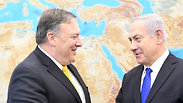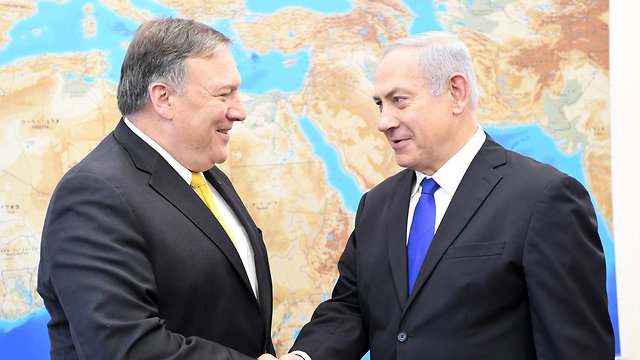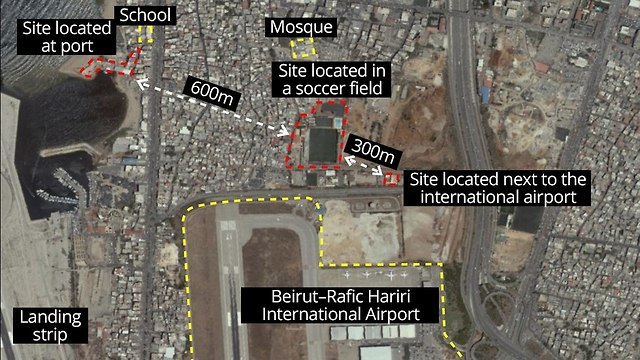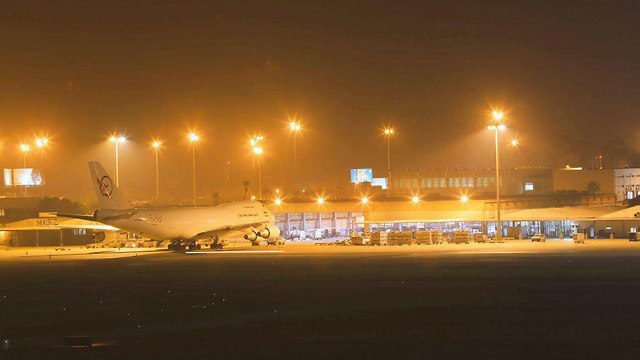
Netanyahu-Pompeo Brussels meeting is a warning to Lebanon
Analysis: PM Netanyahu and US Secretary of State Pompeo will likely discuss the accelerated establishment of Iran and Hezbollah's high-precision guided missile factories in Lebanon, as preparation for a possible Israeli action to thwart these efforts.
The prime minister will be accompanied by the head of the Mossad spy agency, the Israeli national security adviser and his military attache.
Netanyahu and Pompeo's meeting, which was pushed up, is reminiscent of the meetings former prime minister Ehud Olmert held with US administration officials in Washington before bombing the nuclear reactor in Syria in 2007.

Netanyahu and Pompeo will likely discuss the quick establishment of Iran and Hezbollah's high-precision guided missile factories in Lebanon, as preparation for a possible Israeli action to thwart these efforts.
Netanyahu will probably present the Americans with the facts to gain US support in case Israel chooses to act, which could lead to a complaint against the Jewish State at the United Nations Security Council.
One can assume that Pompeo will promise Netanyahu to update President Donald Trump and US National Security Advisor John Bolton on the matter, adding a favorable recommendation to assist Israel in the international arena by giving Iran a "final warning," even before Israel decides to act.
It could be that the announcement on the meeting in Brussels (that could have remained confidential) is Israel's way of signaling to Lebanon and Iran that it is planning to act, maybe in an effort to avoid the need for such action.
Israel might also want the Americans to put pressure on Beirut, as the US has considerable influence over Lebanon—Washington supplies the Lebanese armies with weapons, and the Americans are also mediating between Israel and Lebanon in the dispute on oil drilling rights in the Mediterranean Sea.
However, the timing of the meeting is problematic from an Israeli standpoint. If the prime minister orders action in Lebanon, Syria or both after the police announced Sunday morning that there is sufficient evidence to indict him in Case 4000, he would be accused of doing so in an effort to divert the public's attention from his legal woes and postpone the attorney general's decision on whether to indict him. Netanyahu would be accused of sacrificing IDF soldiers on the altar of his political survival.
With a possible indictment hovering over his head, Netanyahu will have a hard time reaching a decision, knowing that no matter whether he instructs the IDF to act in Syria and Lebanon or not, his opponents would slam him for doing it out of selfish interests. To avoid such criticism, the prime minister would have to receive a definitive approval from the Security Cabinet to everything he does as prime minister and defense minister.
On Thursday, the Syrian news agency SANA reported that the regime's air force continues to repel Israeli "aggression" over southern Syria and that its air defenses have downed several "hostile targets" that were flying over the town of al-Kiswah, south of Damascus, a home to military bases only 50 kilometers away from the Israeli border. The IDF Spokesperson's Office denied this report.
Russia's RIA news agency cited a Syrian security source as saying that the "Syrian air defense forces shot down an Israeli war plane and four missiles." In addition, Syrian state television reported that "the Israeli attack did not achieve its goals because the hostile targets were shot down."
Another Syrian news agency claimed that the sites belonged to Iranian militias, but this report is yet to be confirmed.
The attack, the first Syria has admitted to since Assad’s forces accidentally shot down a Russian intelligence aircraft following an Israeli missile strike on Latakia in September, occurred several hours after a Boeing 747 aircraft belonging to the Iranian cargo airline Fars Air Qeshm flew directly from Tehran to Beirut, reportedly carrying weapon shipments to Hezbollah.
Reuters contributed to this article.













